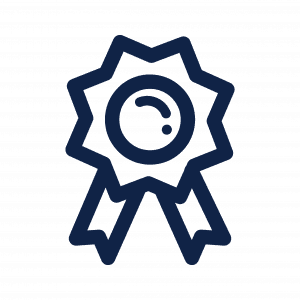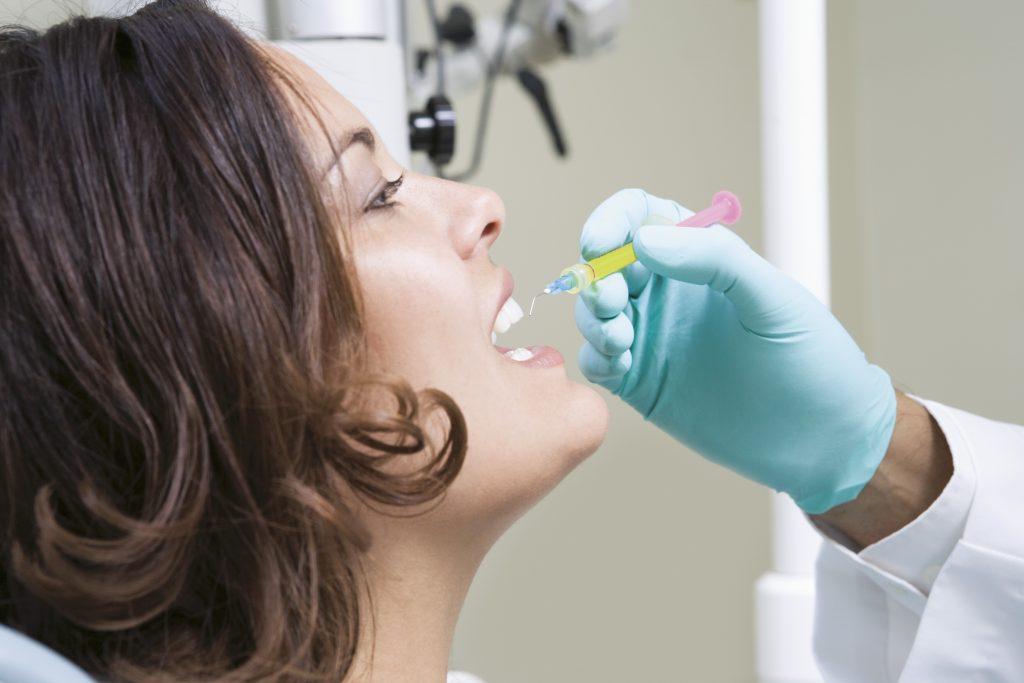Key Takeaways:
- A health science degree opens up various career paths beyond becoming a doctor or nurse, including roles in research and education.
- Accredited schools are essential for a quality education in health science, influencing future employment opportunities.
- Health science degrees vary widely, offering specializations in physical health, mental health, community health, and healthcare administration.
- Health science degrees are equally valid online and on campus, providing flexibility for nontraditional students to balance education with other responsibilities.
Jobs you can get with a Health Science degree include assistant jobs and research jobs in Health Administration and Public Health. When people think of health careers, they often picture doctors and nurses. However, the world needs other health experts too. Is health science a good major? Yes! There’s a lot that you can do with a degree in health science. Careers include assistant jobs, research jobs, and health educator jobs.
With a health science degree, you can explore many careers. Some health science graduates go into research after earning a degree in health science. Careers in academics and other research environments are fulfilling for many people. Others have more hands-on careers.
The world of healthcare is a deep well, and it requires many people in many interdisciplinary fields. Additionally, a health science major prepares students for a graduate degree and professional programs in occupational therapy, physical therapy, and is also an excellent pre-med track for future medical professionals.
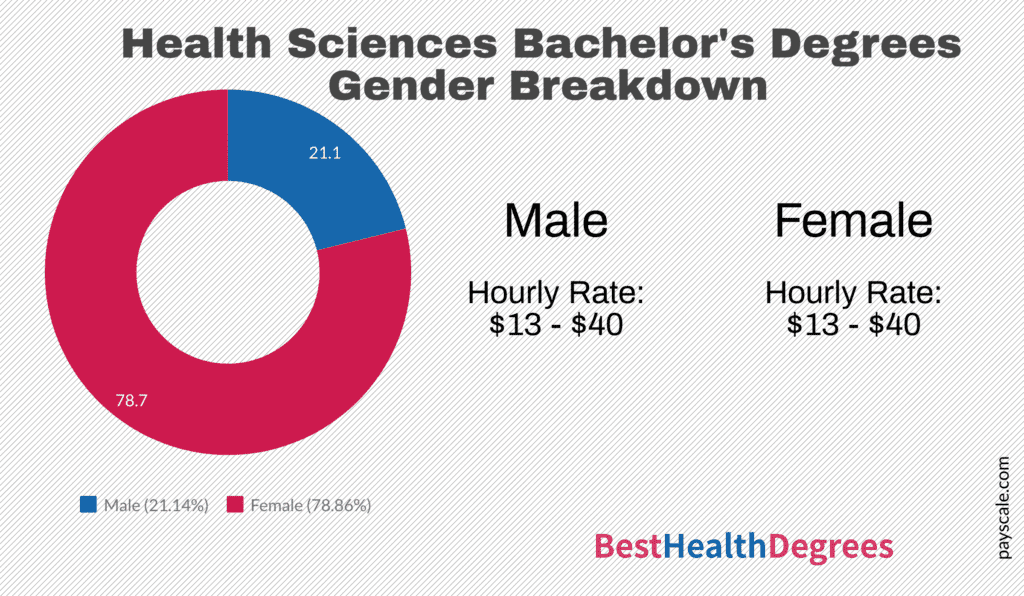
School and Program Accreditation
How do you find the right school for health science? Anyone who wants to go into health science programs must get the right education first, starting with finding an accredited school. What does accreditation mean? The US has several accrediting organizations. Each region of the US has its own, which means that a school in Texas has accreditation from a different organization than a school in Maine.
When these organizations investigate schools and colleges, they look for academic challenges and relevance. If a school consistently provides relevant education and training, it can earn its accreditation. Once an accrediting organization approves a school, students can know that this school is worth their time and can lead to a fulfilling career.
Why is Accreditation Important?
Accreditation matters because employers look for candidates who have the proper education. Generally, employers will take candidates much more seriously if they can demonstrate that they’ve graduated from an accredited school.
However, say that an employer overlooks that a candidate went to a non-accredited school and hires that person anyway. There’s still no guarantee that the new employee has the education they need for the job. They may start work and then realize that everything they know is outdated.
How do you ensure that you choose an accredited school? Most accredited schools gladly offer their accreditation information on their websites. When browsing colleges with health science majors, try the “About Us” section first. You can usually find a link to an accreditation page from there.
Types of Health Science Degrees
Thinking about an online bachelor’s in health science? What about a more traditional on-campus program? As you read in the above paragraphs, the term “health science” covers a lot of ground. Whether one looks into health science degrees online or in person, one can earn health science bachelor’s degrees in a wide range of subjects.
Now, when it comes to health science bachelor’s degrees, a person can go as specific or as broad as they would like to go. When it comes to your options, some of the ones below may interest you.
Types of Degrees
- Associate Degree
- An online bachelor of health science degree
- An on-campus degree
- non-allied health degree
- A certificate
- Master’s Degrees
- Doctoral Degrees or PhD
Physical Health
First, take a look at some of the more specific options. If one wants to go into the physical health field, one could look into a degree as one of the below healthcare and health science professionals.
- Pre-med for students who want to go to medical school:
- Anesthesiology
- Physical therapy
- Nursing
- Respiratory Therapist
Mental Health
Health science degrees, online and in person, also cover mental health topics. For a career in the mental health field, one could go into majors like Counseling, Social work, or also Psychology.
Community Health
For a career in community health, one could look into a public health degree online or a degree in epidemiology. Health Educators and Community Health Workers both offer health education and services to the public, mostly through government agencies and nonprofit organizations.
These professionals focus on global health, disease prevention, and community health problems.
Healthcare Administration
With increased demand, the healthcare industry is growing and there are many new healthcare jobs. These jobs are mostly in direct patient care. However, there are also many roles in research, healthcare management, and health information.
Health informatics and Healthcare Administrators are relatively new degree programs. These professionals evaluate health policy, manage programs that treat patients, and improve health services by analyzing data.
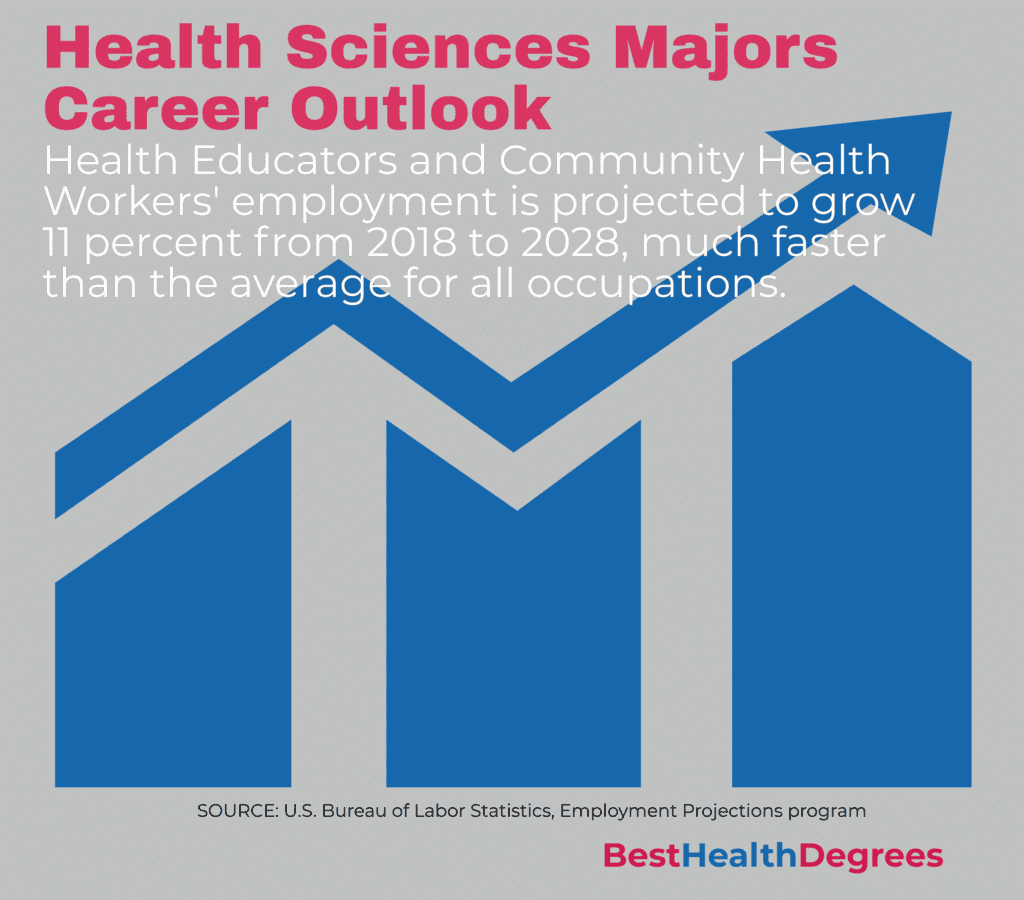
General Health Science Bachelor’s Degree Programs
Next, look at some more general choices. There are more general health science bachelor’s degree programs. When a person pursues a general health science degree, that person gets a multidisciplinary degree that covers a lot of ground.
Students in these programs learn a broad overview of physical, mental, and societal health subjects. Some of these majors offer concentrations so students can tailor their degrees to their goals.
For those seeking a bachelor of health sciences, online options exist as well. You saw the online bachelor’s in health science mentioned briefly above, but in the next couple of paragraphs, you’ll get a deeper look at how to pursue an online bachelor’s in health science.
Health science online degrees have proven beneficial for a lot of students. If you earn an online degree in health science, then you can rest assured that your degree is worth just as much as it would have been if you had earned it on campus.
Online Degrees vs On-Campus
Health science online degrees use the same classes and materials as on-campus programs. The only difference is that students can earn an online degree in health science from anywhere. One can access their classes and materials if one has a reliable internet connection.
Health science online degrees are for working adults or otherwise nontraditional students. Students pursuing an online degree in health science usually, for one reason or another, don’t have the time or flexibility in their lives to attend all of their classes on campus. By pursuing health science programs online, these students can attend classes in between taking care of their other responsibilities.
However, depending on the degree, you’re pursuing and the type of career you want to achieve, you may also have to organize some in-person work. To be clear, you can still earn your degree online, but some careers and certifications do require hands-on experience. Some health science degrees, online or otherwise, require students to arrange clinical work with local hospitals or healthcare organizations.
Furthermore, when earning an online bachelor’s degree in health science, remember that you’ll have substantial self-discipline to get your work done, especially if your classes have no set log-in times. An online Bachelor’s of Health Science degree is an excellent choice for many people, but it lacks some of the campus format’s structure.
While pursuing a Bachelor of Health Sciences online, make sure you put as much thought and care into choosing your school as you would for a campus learning experience. When it comes to getting an online bachelor of health science degree, accreditation matters just as much as it does for on-campus programs.
Certifications and Licenses for Health Science Professionals
Depending on your career interests, you may also need a license to practice once you graduate. For example, healthcare professionals like social workers, doctors, and nurses all need licenses to do their work legally. If your intended career does require a license, keep that in mind when you look for programs of study for health-related topics. Some programs specifically prepare their students for licensure exams.
Health science certifications are also an option for specific careers and career advancement. If you don’t want a career that requires a license and a full bachelor’s degree, you can earn a health sciences certificate in less time than it would take to earn a full bachelor’s degree.
You can get careers with a health sciences certificate, including assistant jobs and medical billing jobs. Or, you can also find a health science certificate online. However, as with a bachelor’s degree, you should put time and research into choosing health science certifications. Look for programs that have a reputation for relevance and excellence.
Careers in Health Science
What can you do with a health science major? What job can you get with a health science degree? Once again, the possibilities are seemingly endless when it comes to jobs you can get with a health science degree. Once again, job possibilities depend on the specific types of health science programs. As stated a couple of times above, health science bachelor’s degree jobs cover different health types.
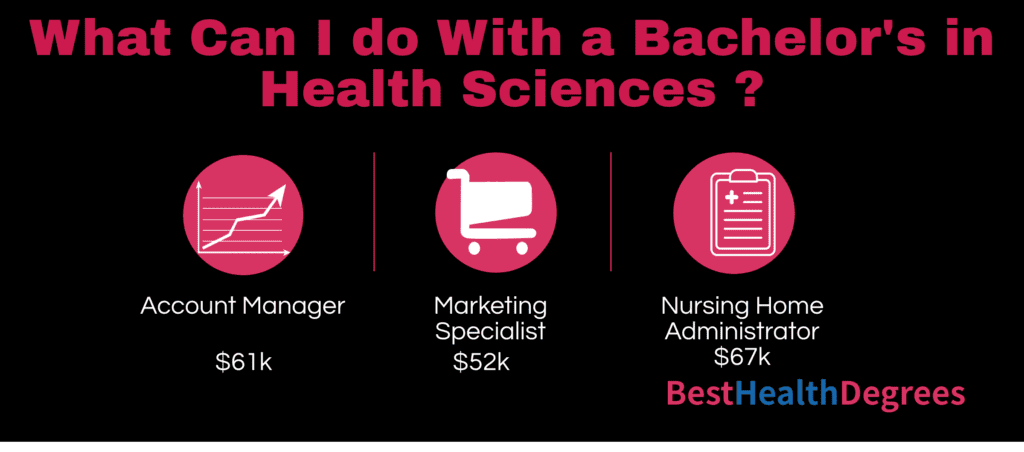
What is a Health Science Major?
Health Science is a multidisciplinary field that includes medical professions, natural sciences, and behavioral sciences. These professionals promote wellness and good health in individuals and communities. Health Science is also a specific major at some schools and there are many health science degree careers.
However, some jobs do not require a health science major. Some careers, such as nursing, are not jobs you can get with a health sciences degree. They require one of those more specific degrees that fall under the health science umbrella but have a more narrow focus.
First, look at some jobs you might consider if you’re interested in physical health. The following are just a few examples of many health science bachelor’s degree jobs that a person might consider. Remember that some of these require a specific degree in that field, not general health science programs. So, what can you do with a health science major?
Degrees in Health Care
Nurse
Nursing falls under the umbrella of health sciences bachelor’s degree jobs. However, this career explicitly requires a bachelor of science in nursing degree, clinical experience, and state licensure. A nursing program prepares graduates for entry-level positions in nursing.
Physical therapist
Physical therapy is also a top choice among health sciences bachelor’s degree jobs. This career in the healthcare field offers a high average salary and is a popular choice. Individuals need a master’s degree to be physical therapists but can work under a PT with a bachelor’s.
Phlebotomist
Phlebotomists draw blood from patients in different medical settings. Phlebotomists can work with just a certificate. However, a bachelor’s degree in health sciences certainly doesn’t hurt.
Jobs in Mental Health
Next, there are health science bachelor’s degree jobs that focus specifically on mental health. Once again, not all of these fall specifically into the “jobs with a health science degree” category.
Some require a different degree that, while technically falling under the health science umbrella, is more narrow than degrees that focus on the health sciences in general. This includes:
- Therapist
- Social worker
- Life Coach
- Health Educator
Then, there are jobs with a health science degree that focus on community-wide health. Public health advisors and epidemiologists fall into this category.
Jobs With a Health Science Degree
Now, if you look specifically into jobs with a health science degree, that is, jobs that one can get specific with a degree in health sciences, you’ll notice a lot of options. This degree comes with too many potential job pathways to list in this article. When you major in health science, jobs abound virtually everywhere.
Here are just some of the many health science bachelor’s degree jobs that a person might pursue.
Dental Hygienist
What jobs can you get with a health sciences degree experience? Becoming a dental hygienist is a popular choice. Hygienists clean patients’ teeth and provide advice before the dentist comes in to check for cavities and do other dental work.
Physician’s Assistant
If you’re pursuing a bachelor of science in health science, jobs like physician’s assistant have probably crossed your radar. That’s because physician’s assistant careers are a great choice for those with a bachelor of health science degree.
A physician assistant works in many different settings. They work with a doctor to diagnose patients and administer the correct treatment. Students interested in this path should take biomedical sciences and laboratory science classes. They also need excellent problem-solving and critical-thinking skills.
Nutritionist
Becoming a nutritionist is an excellent option for those seeking a bachelor of health science degree. Nutritionists work for individuals and organizations, providing coaching and meal plans emphasizing healthy eating. These career paths in medical services are a good choice for entry-level roles in dietetics and nutrition.
Pharmaceutical Sales Representative
A medical or pharmaceutical sales representative educates others about products they may purchase. They need technical and scientific knowledge about their products and the health science field. Many work for pharmaceutical companies or sell medical equipment to healthcare facilities.
What are Allied Health Professionals?
Again, those are just a few of the most popular bachelor of health science degree jobs, but the field is quite diverse. Most people who get jobs with a bachelor of health science degree are allied health workers. Allied health is important to healthcare. But, what is allied health? And what is an allied health professional?
Medical careers include doctors, nurses, dentists, and pharmacists. The remainder of the medical workers are allied health professionals. Allied health careers are the bulk of jobs for health science degree holders.
What are the Best Allied Health Careers?
Well, that depends on the person. Since the jobs you can get with a health science degree are so numerous, the best-allied health careers for you are simply the ones in which you can see yourself thrive. The highest-paid allied health careers are physician’s assistants (over $84,000 per year) and dental hygienists ($68,000).
Those two careers and most other allied health career options are growing fast. In any case, for those who have a bachelor’s degree in health science, job prospects look good. According to the Bureau of Labor Statistics (BLS), popular jobs are lab technicians, medical assistants, patient care advocates, and patient service representatives.
Salary with a Health Science Degree
With a degree in health science, salary ranges are consistently high. If you have a health science degree, your salary may be very low on your list of worries. Health science salaries tend to be higher than average because health science experts are in high demand.
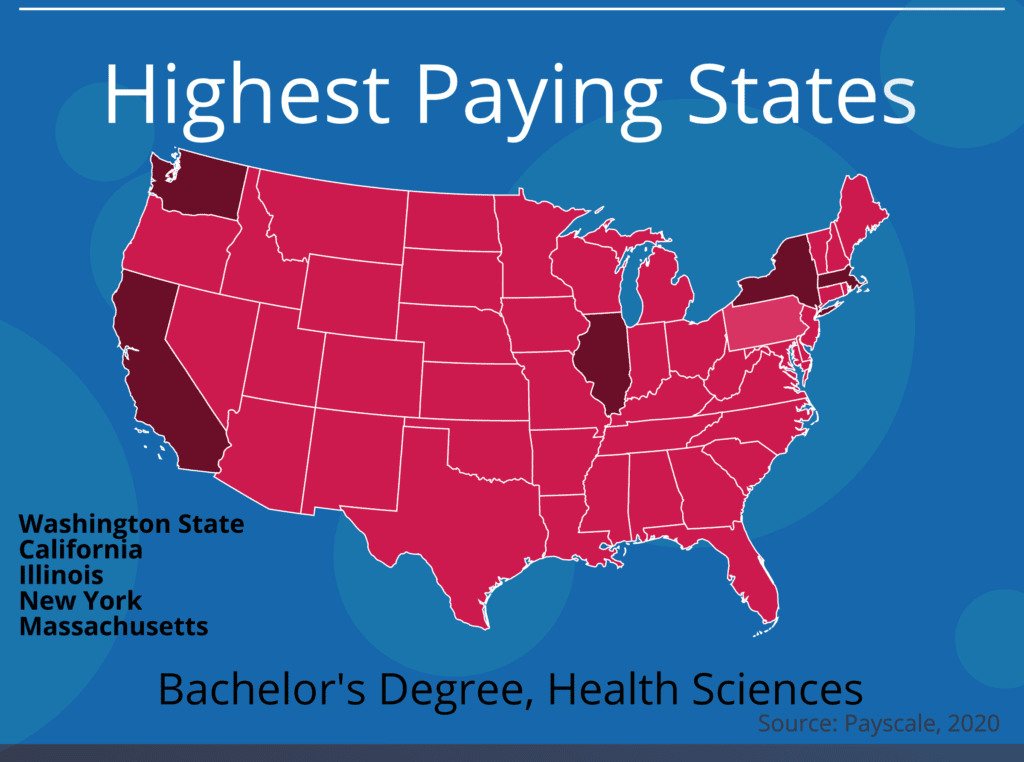
Health science salaries average in the $70,00 range. Keep in mind, however, that this is the mid-range average. A salary for health science can get higher or lower depending on the situation.
A salary for health science can also look larger or smaller depending on the specific focus. Salary ranges for a physician’s assistant with a bachelor’s in health science can get quite a bit higher. However, salary shouldn’t be the only factor in choosing your career path. Again, look for careers that best fit your needs and interests.
What else can influence a salary? Location. A bachelor’s in health science salary can be much more significant for those who work in cities than those who work in rural areas.
Professional Organizations
Finally, look into some professional organizations. Professional organizations provide excellent opportunities for networking and getting to know the job market. Plus, some of these organizations may offer continuing education credits for those who want to expand their knowledge and salary potential. Organizations for health professionals include:
- National Society of Allied Health
- American Medical Association
- American Society of Radiologic Technologists
- National Healthcareer Association
- Joint Commission on Allied Health in Ophthalmology
Related:
- 25 Best Health Science Bachelor’s Programs
- 15 Best Online Health Science Bachelor’s Programs
- 10 Fastest Online Health Science Bachelor’s Programs
- What Does a Nutritionist Do?
- Most Affordable Online Bachelor’s in Nutrition
- CNA Degree Guide
- What Can You Do With a Master’s in Psychology
- Best Types of Counseling Degrees
- What are the Best Master of Health Science Jobs?
- What Can You Do with a Human Service Degree?
